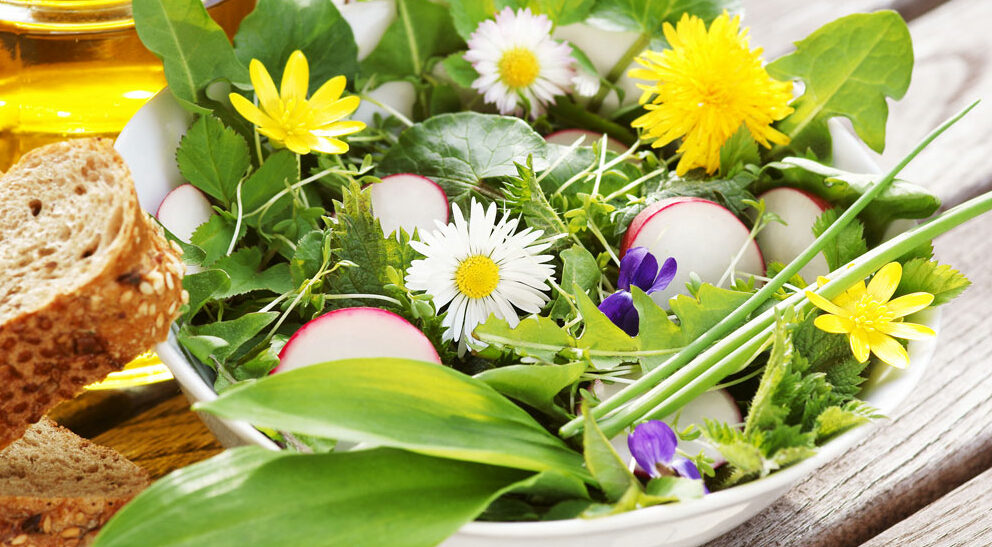The healthy gut - part 2
The Kapha season , which has now begun, has its opportunities and risks like any other season. Kapha means juice, strength and fertility when it is in balance. When Kapha is too much, it leads to excessive fluid retention, mucus production, fatigue, heaviness and lack of growth. Our sedentary lifestyles, an overabundance of industrially produced food and a disconnection from natural rhythms leads to an increase in kapha and ama in many people. Obesity , seasonal allergies and spring fatigue are typical expressions of too much kapha. .

A healthy, well-functioning digestive system is a prerequisite for eliminating excess kapha. Many people wonder what is so special about "Ayurvedic nutrition". Do you have to eat "Indian" food to follow the recommendations of AyurVeda? Not at all! Ayurvedic nutrition rather means a diet adapted to the person, the time of day and season and the climatic environment . Spices play an important role in this, as they contribute significantly to improving digestive power.
Digestive biorhythm
The changing influences of the day and the seasons underlie the three doshas Vata, Pitta and Kapha. Spices and medicinal herbs can be used to balance the influence of the doshas very well.
Warming spices
These should be used especially during Kapha and Vata times. Vata and Kapha are cool and are balanced by warming applications. .
- Kapha time of day: 6:00 a.m. to 10:00 a.m. and 6:00 p.m. to 10:00 p.m.
- Kapha Season: Spring (March - June)
- Vata time of day: 2:00 p.m. to 6:00 p.m. and 2:00 a.m. to 6:00 a.m.
- Vata Season: Autumn and Winter (October - February)
Warming spices include: Ginger, turmeric, cinnamon, clove, pepper, chilli, cumin, cumin Native warming spices: Basil, all leeks, cress
Cooling spices
These should be used especially during the Pitta period. Pitta is warm and needs cooling applications to balance it. .
- Pitta time of day: 10:00 to 12:00 and 22:00 to 2:00
- Pitta season: Summer (July - September)
Cooling spices include: Fennel, coriander, cardamom Native cooling culinary herbs: sage, rosemary, thyme and marjoram All spices supply the body with secondary plant compounds that stimulate the secretion of the digestive glands. By using them, the vital substances contained in the food can be broken down and assimilated much better. This is what is meant by " strengthening the digestive fire Agni ".
Fresh wild herbs
In spring , i.e. during the Kapha period , it is especially recommended to use as many fresh green herbs, sprouts, buds and vegetables as possible in the kitchen. After the long Vata season, you will finally be able to eat food that is particularly rich in vital substances from the local environment. Use your free time to gather fresh green delicacies in parks, meadows and forests: Wild garlic, watercress, goutweed, nettle and dandelion leaves are the first delicious harbingers of spring that are now sprouting everywhere. Also collect blossoms of daisies and primroses with which you can decorate your meals. With just a handful of herbs, you can turn any meal into a special experience. You can add the wild herbs finely chopped and raw as spices to your salads. They are also delicious in soups, sauces and in cereals. More intense tasting herbs such as wild garlic or cress can be coarsely chopped and roasted in ghee before sprinkling on a sandwich or in a main dish.
Medicinal herbs for the intestines
Among the most important medicinal herbs for the intestines are the three Beleric fruits, amalaki, bibhitaki and haritaki . They are used both individually and together in the form of triphala (MA505). All three have a mild anti-inflammatory effect on the mucous membranes of the gastrointestinal tract, improve the detoxification activity of the liver through their bitter substances and stimulate the flow of bile. Thus they lead to a regeneration of the intestinal mucous membranes and cause a balanced peristaltic movement of the intestines. The effects of these three fruits on the intestines are highly valued in AyurVeda. The ancient texts recommend a permanent application in order to strengthen the digestive power in the long term and thus ensure that all tissues and organs can be permanently supplied with all vital substances.
Summary
Ayurvedic nutrition is adapted to the person, time of day, season and climatic conditions. This enables the intestines to always provide the body with the right vital substances. Spices and medicinal herbs are important to support the digestive power (Agni). In spring, fresh wild herbs are particularly recommended to prevent Kapha disorders and improve vitality.



We look forward to your feedback!